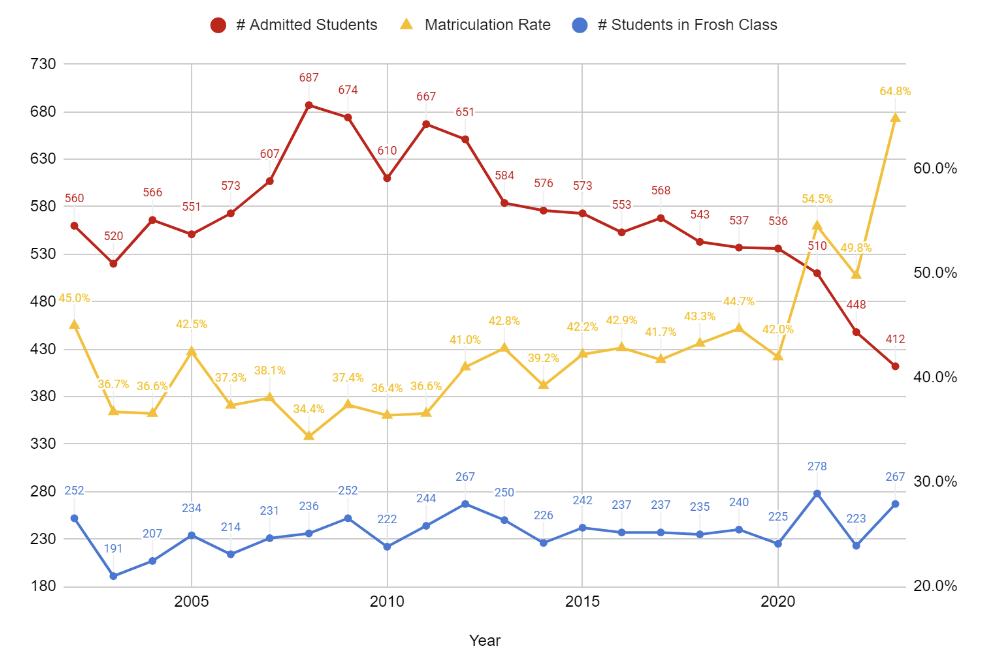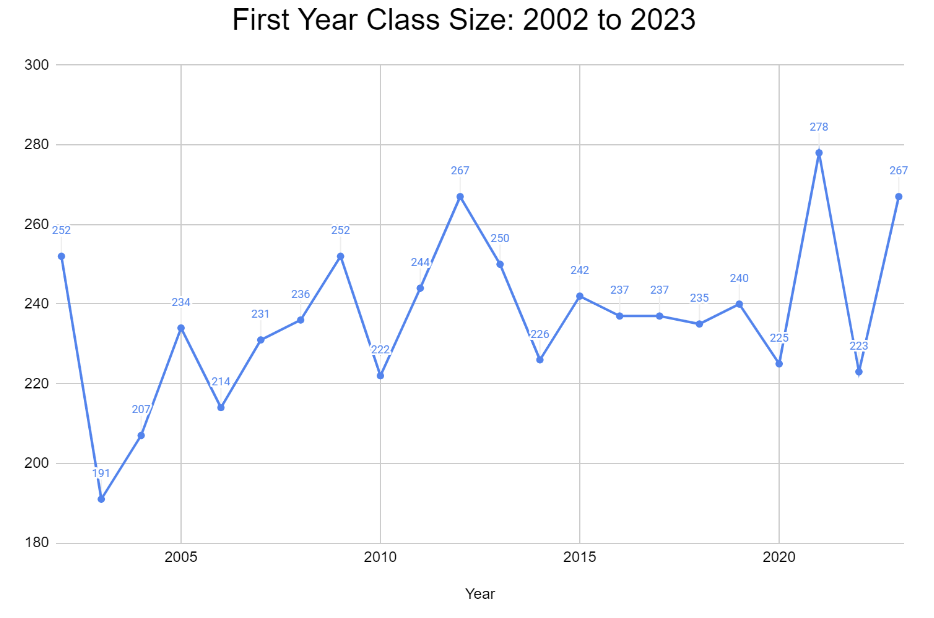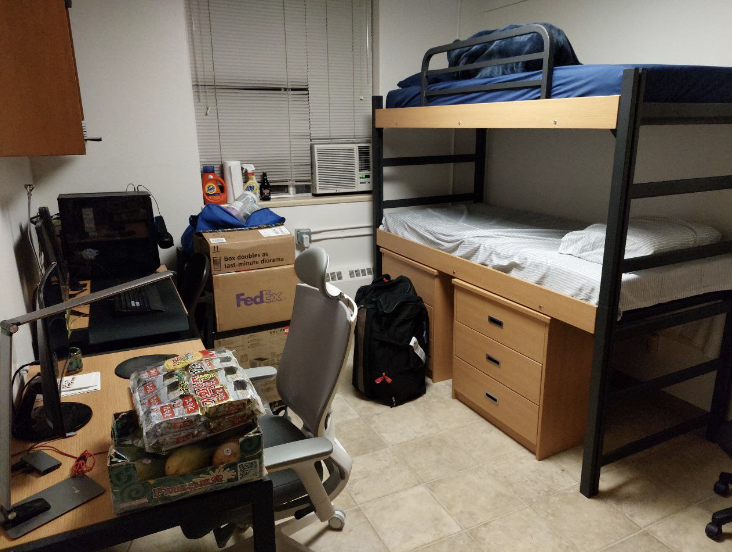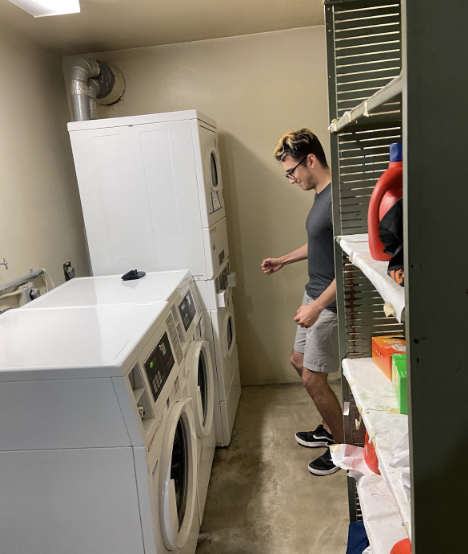Is the Housing “Crisis” Really a Crisis?
Caltech Students: Please fill out the IHC’s feedback forms about Housing and Rotation before July 1st, 2023! thanks :)
When the news broke that 271 students committed to Caltech for the Class of 2027, current students and faculty panicked. How would Caltech accommodate around 40 more freshmen than expected? Suddenly, the rules for upperclassmen picking rooms on campus were changing and students scrambled to update their plans. But why did so many students feel cheated, and is there really a housing crisis on campus?
Debunking the 4-Year Guarantee
Contrary to popular belief, Caltech undergrads are not guaranteed four years of on-campus housing. While an average >90% of students live on campus each year, according to Associate Director of Student Housing Joe Bennethum, only first- and second-year students are guaranteed.
There is no mention of a guarantee in the Housing Contracts; not in Admissions materials; and not in any communications from the Institute. The Housing Office makes the 2-year promise clear in their Resident Guide and Housing Policies manual, stating “Caltech Housing guarantees all first and second year undergraduates… student housing” This policy has been consistent since it was changed from promising only 1 year in 2019. The most recent time that all undergraduates were assured four years of on-campus housing was in 2010.
The 2020 and 2021 Caltech Catalogs, however, vaguely refer to a “four-year residency expectation.” This language was removed for the 2022 catalog. This also appears in Degree Audits, a document that lists graduation requirements, on REGIS. While this has often been taken to indicate a housing guarantee, Bennethum clarified to the Tech that, in this case, “residency” simply refers to “enrollment.”
From the Perspective of Admissions
Part of the recent housing “crisis” is rooted in the unexpectedly large Class of 2027. It is tempting to wonder whether the second-largest class size in the past 20 years is the result of some miscommunication or a mistake on the Admissions Committee’s part. After all, only two years before, admissions found itself in a similar quandary, with 279 students accepting Caltech’s invitation to attend, the highest in history. However, according to Jared Leadbetter, the chair of first-year admissions, this is not the story.
For the last seven years, Caltech has admitted progressively fewer students to each class. According to Leadbetter, the Institute is united in its goal to keep the incoming class size to between 220 to 230 students. Last year, Admissions made 430 offers and 209 accepted (14 MORE were pulled from the waitlist, bringing the total to 223). This year, they made 412 offers and 267 accepted! “It’s always the same issue,” Leadbetter explains. “How many do you admit, and how many will say yes?” The matriculation rate this year was unprecedented: at 65.5%, the yield has never been this high since the 1970s.
Comparable universities such as MIT, Harvard, and Stanford all have had yield rates in the high 70% or low 80% for the past 10 years. Current trends show that Caltech’s yield rate is increasing faster than that of similar colleges, but there is still a large gap. In addition, many of these other institutions have much larger class sizes, around 1,100 for MIT and around 1,500 for Harvard. This means that small changes in yield will not affect them as much. Other universities also have housing lotteries that occur before the decision date in May, but they simply have more space, so a slightly higher than average class size will not be as impactful.

Timeline of the number of admitted students, since 2002. In the last ten years, Caltech has progressively admitted fewer and fewer students.

Timeline of first-year class size, courtesy of Jared Leadbetter. The incoming class sizes have historically been up and down, with unprecedented peaks in the past that are similar to our current situation.
“There’s this perception of ‘Blame the administration!’ That’s understandable,” says Leadbetter. “The lack of sufficient housing is significantly inconvenient, and it’s not easy to find an apartment for next year. But it’s a little deflating to see that [blame] as the main response to these positive trends. We’re really happy – it shows that [prospective] students are better informed about Caltech.”
The Unintended Effect of Admissions on Housing
Perhaps the housing crisis is not entirely the fault of Admissions, but the Housing Office was left in a tough spot. By the time the number of incoming students came out on May 2, the fall lottery process had already started.
The lottery starts this early because it takes a long time to go through the whole process. Traditionally, the fall lottery is held before the summer lottery so that students can have the opportunity to pick into their fall room for the summer (known as “settling”). This means that the fall lottery must be held earlier in the third term to have enough time to do the fall lottery then the summer lottery.
As a result, the Housing Office could not have known exactly how many incoming first-years there were—they had to work under the Admissions Committee’s estimate, which was nowhere near as large as the class size turned out to be.
There are two types of housing available on campus. The most popular is living in one of the eight student houses. Though they are small, students are drawn to living among their friends, surrounded by a unique “house culture.”
The second type is unaffiliated housing, meant for students who are not a member of a house. Bechtel is one such option. Opening in 2018 and offering a whopping 212 beds, it is the top choice among unaffiliated students. Then comes Marks and Braun. While originally meant to house 30 and 29 students respectively, extra beds and desks have been added to their rooms, thus doubling their original capacity. Not only does the cramped living space make this an undesirable residence for students, but residents there cite constant maintenance issues, including a lack of hot water and broken laundry machines.

A room in Marks, which was originally intended to be a single. Since the pandemic, however, Marks rooms have been adapted to become uncomfortably crowded doubles. That’s one of the reasons why students would prefer to live in Bechtel, if they cannot live in a house.

The Laundry Machine in Marks. There are two washers and two dryers for around 50 residents, the same as in Braun. Michael Gutierrez, 6’1”, shows the cramped space, and comments on the rank smell, not present in the other residences.
In accordance with the estimated number of incoming frosh, Housing had already established the number of spaces available to upperclassmen in Bechtel, and decided how many suites would be allotted to both the first and second unaffiliated lotteries.
The first unaffiliated lottery gave priority to groups of students picking suites based on not only lottery number, but also on number of unaffiliated students. “Groups with a higher number of unaffiliated students per group size will have priority,” according to the Housing Undergrad Lottery Process website. In other words, if two groups of 8 people applied for a Bechtel suite, the first group containing 3 unaffiliated students and the second with 7 unaffiliated students, the second group would be offered the suite. Previously, you only needed two students to get the chance for the first round, and priority after that was based on lottery numbers. This change was introduced to maximize the number of unaffiliated students selecting Bechtel. Since not every student has the opportunity to live in the houses, and Bechtel is the more attractive living space compared to Marks or Braun, unaffiliated students are given priority to choose Bechtel.
Many students, including Lily DeBell (Bi ‘24, Unaffiliated) and Hannah Fisher (ME ‘24, Unaffiliated) dropped house membership in order to get into this round of the lottery.
Students Out of Housing
In January, both DeBell and Fisher dropped their affiliation with Venerable in hopes of securing a Bechtel suite for next year. Their suite only had two unaffiliated students, so under the new rules, they did not have high enough priority to get a suite in the first round. Having dropped their housing affiliations, their only other option was the general lottery for a Bechtel suite.
Based on their lottery number and the number of spaces left in Bechtel, they had a sense that they would be guaranteed a suite. Then, two days before picking their room, Bennethum sent out an email stating that housing was decreasing the number of suites available in Bechtel to make space for the new students.
Suddenly, 30 beds became unavailable and DeBell and Fisher were left to scramble again. After some math on the number of remaining beds and their lottery picks, they thought there would not be enough room for them on campus. With his daughter left to hunt for off-campus housing, Fisher’s father emailed Maria A. Katsas, the Executive Director of Student Auxiliary Services, to express his concerns.
He stated, “I would like to strongly express that I feel it is both wrong and unfair to change the conditions of the housing lottery in the middle of the lottery,” and later pointed out that the fact the lottery takes place before the date that first-years must commit “makes absolutely no sense at all.”
Fisher claims that when she and DeBell started to realize they would not have on-campus housing, they felt “extreme anger… and then sadness.” They had believed they were guaranteed four years of on-campus housing, and they felt cheated out of it. They were shocked to hear, weeks later, that there was space left in Marks and Braun for them, but it was not enough to convince them to take Caltech up on the offer.
What Could Have Been Different
While Fisher and DeBell felt that they deserved the Bechtel spaces more than the first-years, and that the incoming class should be put into Marks and Braun instead, other students disagree. Juan Luchsinger (ME ‘25, Blacker) stated “I would prefer that they [the first-years] get Bechtel rooms/any housing over me.” The first year is supposed to ease incoming students into Caltech. This is also why Housing and the ORE want frosh to live in Bechtel instead of Marks and Braun, because it will provide a better living experience. Bennethum guessed that they put the freshman because Bechtel “[has] more support networks for the incoming students.”
Could the situation this year have been handled better? Fisher said that in the interest of fairness, the whole lottery should have been redone. She claims that because the rules were changed midway though, unfair advantage was taken of current students. However, the lottery process is very time-consuming, “like 3-D tetris,” according to Bennethum. There likely would not have been enough time to redo the fall lottery, especially while they were in the middle of the summer lottery.
Bennethum stated that in future years he would consider doing the summer lottery before the fall lottery. This would lead to less or possibly no overlap between the fall lottery and decision day meaning housing could have a much more accurate count of incoming students. With a more accurate count, ideally they would not have to change the number of spaces midway through the lottery. But even then, students can gain admission off the waitlist at other schools between committing to Caltech and the start of the school year, making this freshmen number rather volatile.
When asked if there were any plans to acquire more housing for students, either on campus or in Caltech-owned off-campus properties, Bennethum said that there were no current plans. While he would “advocate for the students” in getting off campus housing, it is ultimately up to the Institute—and the Institute would likely prioritize graduate students in Caltech-owned off-campus housing.
So, as with the Admissions Committee, the Housing Office’s story is also a complicated one, and not as easy to solve as students would hope.
The Past
2021 also saw a record number of students, however 2021 was a special year due to the coronavirus pandemic. In 2021 the fall lottery was done during the summer, way past when the number of incoming freshmen was confirmed. Because students were off campus that year anyway, doing it over the summer was essentially equivalent to having it during the year. However, ideally the process is done on campus in person which is why it is normally done third term.
There was not enough space in 2021 for everyone to live on campus, but similar to this year, some people opted out of the lottery. In addition, in order to make more space on campus, all the singles in marks and braun were converted into doubles. This increased the number of beds on campus significantly. So while record number of admission has happened in the past (2021), many factors made that year special and unique.
Communication with Administration
Perhaps better communication between students and the administration would have shown students that the situation was really difficult from the perspective of the Housing Office. The Student Life and Housing Committee, composed of Caltech faculty, is charged with being “concerned with matters relating to housing for undergraduate and graduate students.” The Committee is expected to be a resource for students to express their concerns, or a voice for the students to communicate with the administration.
Ryan B. Patterson, a professor in physics, has been a member of this committee since July 1, 2018. When asked about his role on the committee, however, he responded “I’m on a committee?” Nets H. Katz, a mathematics professor, shared a similar story. Katz recalls joining the Student Life and Housing Committee on July 1st, 2022, to “be more involved… with undergraduates,” but has since not heard of a single meeting and says he’s had no involvement with the committee.
So What Now?
As it stands, 40 students have opted out of the fall housing lottery. This is about average, with most years having between 30 and 50 students opting out. That number, however, has been increasing since the beginning of the lottery on Friday, April 14th. It is unclear if this increase is due to more students “doing the math” like Fisher and DeBell, or if students simply neglected to opt out until later. Because this number is not that much higher than normal, it is unclear how many students actually felt that they had been “kicked off campus,” as Fisher and DeBell did.
Now that the fall lottery is in the process of wrapping up, there is theoretically enough space for everyone who remains to be placed.
This housing “crisis” came out of an unprecedented admissions cycle, catching the Admissions Committee, the Housing Office, and several returning students off-guard. At the end of the day, DeBell expressed “I am not saying that freshmen should live off campus… But the tuition is exactly the same for everyone. It’s like all of a sudden the upperclassmen are getting booted in a way that feels very unfair. I TA, I Dean’s tutor, I volunteer for the Caltech Y. I do a lot of things and work for this campus. For this to happen now… it’s like what gives?"